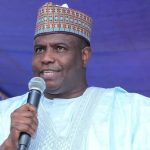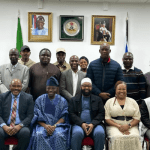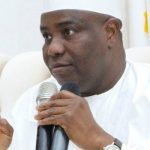Over 56 million Nigerians are still unable to read and write, and this alongside the high number of out-of-school children calls for concern.
As Nigeria joins the rest of the world to commemorate the International literacy Day, the federal Government has reaffirmed it commitment to addressing illiteracy in the country
September 8 is observed as International Literacy Day to raise awareness of the importance of literacy for individuals as well as for communities as whole.
This special day reminds global citizens that it is the basic right of every person to have access to education.
Unfortunately, existing data does not support this assertion, with the global literacy rate for women standing at 81%, compared to 89% for men.
To put that in proper perspective, 63% of all illiterates are female.
Data from the National commission for mass literacy, adult and non formal education shows that, over 56 million of Nigeria’s population are still unable to read and write.

At the occasion to commemorate the international literacy Day, the Nigeria government pledges to address the anomaly
For UNESCO, the world has achieved significant strides in closing the illiteracy gap, plans would be strengthened to support the literacy efforts in countries all over.
The theme for the 2023 commemoration is tagged: “Promoting literacy for a world in transition: Building the foundation for sustainable and peaceful societies”
It stresses the need to join efforts to accelerate progress towards the achievement of Sustainable Development Goal 4 on education and lifelong learning.
Over 56 million Nigerians are still unable to read and write, and this alongside the high number of out-of-school children calls for concern.
As Nigeria joins the rest of the world to commemorate the International literacy Day, the federal Government has reaffirmed it commitment to addressing illiteracy in the country
September 8 is observed as International Literacy Day to raise awareness of the importance of literacy for individuals as well as for communities as whole.
This special day reminds global citizens that it is the basic right of every person to have access to education.
Unfortunately, existing data does not support this assertion, with the global literacy rate for women standing at 81%, compared to 89% for men.
To put that in proper perspective, 63% of all illiterates are female.
Data from the National commission for mass literacy, adult and non formal education shows that, over 56 million of Nigeria’s population are still unable to read and write.

At the occasion to commemorate the international literacy Day, the Nigeria government pledges to address the anomaly
For UNESCO, the world has achieved significant strides in closing the illiteracy gap, plans would be strengthened to support the literacy efforts in countries all over.
The theme for the 2023 commemoration is tagged: “Promoting literacy for a world in transition: Building the foundation for sustainable and peaceful societies”
It stresses the need to join efforts to accelerate progress towards the achievement of Sustainable Development Goal 4 on education and lifelong learning.
Over 56 million Nigerians are still unable to read and write, and this alongside the high number of out-of-school children calls for concern.
As Nigeria joins the rest of the world to commemorate the International literacy Day, the federal Government has reaffirmed it commitment to addressing illiteracy in the country
September 8 is observed as International Literacy Day to raise awareness of the importance of literacy for individuals as well as for communities as whole.
This special day reminds global citizens that it is the basic right of every person to have access to education.
Unfortunately, existing data does not support this assertion, with the global literacy rate for women standing at 81%, compared to 89% for men.
To put that in proper perspective, 63% of all illiterates are female.
Data from the National commission for mass literacy, adult and non formal education shows that, over 56 million of Nigeria’s population are still unable to read and write.

At the occasion to commemorate the international literacy Day, the Nigeria government pledges to address the anomaly
For UNESCO, the world has achieved significant strides in closing the illiteracy gap, plans would be strengthened to support the literacy efforts in countries all over.
The theme for the 2023 commemoration is tagged: “Promoting literacy for a world in transition: Building the foundation for sustainable and peaceful societies”
It stresses the need to join efforts to accelerate progress towards the achievement of Sustainable Development Goal 4 on education and lifelong learning.
Over 56 million Nigerians are still unable to read and write, and this alongside the high number of out-of-school children calls for concern.
As Nigeria joins the rest of the world to commemorate the International literacy Day, the federal Government has reaffirmed it commitment to addressing illiteracy in the country
September 8 is observed as International Literacy Day to raise awareness of the importance of literacy for individuals as well as for communities as whole.
This special day reminds global citizens that it is the basic right of every person to have access to education.
Unfortunately, existing data does not support this assertion, with the global literacy rate for women standing at 81%, compared to 89% for men.
To put that in proper perspective, 63% of all illiterates are female.
Data from the National commission for mass literacy, adult and non formal education shows that, over 56 million of Nigeria’s population are still unable to read and write.

At the occasion to commemorate the international literacy Day, the Nigeria government pledges to address the anomaly
For UNESCO, the world has achieved significant strides in closing the illiteracy gap, plans would be strengthened to support the literacy efforts in countries all over.
The theme for the 2023 commemoration is tagged: “Promoting literacy for a world in transition: Building the foundation for sustainable and peaceful societies”
It stresses the need to join efforts to accelerate progress towards the achievement of Sustainable Development Goal 4 on education and lifelong learning.
Over 56 million Nigerians are still unable to read and write, and this alongside the high number of out-of-school children calls for concern.
As Nigeria joins the rest of the world to commemorate the International literacy Day, the federal Government has reaffirmed it commitment to addressing illiteracy in the country
September 8 is observed as International Literacy Day to raise awareness of the importance of literacy for individuals as well as for communities as whole.
This special day reminds global citizens that it is the basic right of every person to have access to education.
Unfortunately, existing data does not support this assertion, with the global literacy rate for women standing at 81%, compared to 89% for men.
To put that in proper perspective, 63% of all illiterates are female.
Data from the National commission for mass literacy, adult and non formal education shows that, over 56 million of Nigeria’s population are still unable to read and write.

At the occasion to commemorate the international literacy Day, the Nigeria government pledges to address the anomaly
For UNESCO, the world has achieved significant strides in closing the illiteracy gap, plans would be strengthened to support the literacy efforts in countries all over.
The theme for the 2023 commemoration is tagged: “Promoting literacy for a world in transition: Building the foundation for sustainable and peaceful societies”
It stresses the need to join efforts to accelerate progress towards the achievement of Sustainable Development Goal 4 on education and lifelong learning.
Over 56 million Nigerians are still unable to read and write, and this alongside the high number of out-of-school children calls for concern.
As Nigeria joins the rest of the world to commemorate the International literacy Day, the federal Government has reaffirmed it commitment to addressing illiteracy in the country
September 8 is observed as International Literacy Day to raise awareness of the importance of literacy for individuals as well as for communities as whole.
This special day reminds global citizens that it is the basic right of every person to have access to education.
Unfortunately, existing data does not support this assertion, with the global literacy rate for women standing at 81%, compared to 89% for men.
To put that in proper perspective, 63% of all illiterates are female.
Data from the National commission for mass literacy, adult and non formal education shows that, over 56 million of Nigeria’s population are still unable to read and write.

At the occasion to commemorate the international literacy Day, the Nigeria government pledges to address the anomaly
For UNESCO, the world has achieved significant strides in closing the illiteracy gap, plans would be strengthened to support the literacy efforts in countries all over.
The theme for the 2023 commemoration is tagged: “Promoting literacy for a world in transition: Building the foundation for sustainable and peaceful societies”
It stresses the need to join efforts to accelerate progress towards the achievement of Sustainable Development Goal 4 on education and lifelong learning.
Over 56 million Nigerians are still unable to read and write, and this alongside the high number of out-of-school children calls for concern.
As Nigeria joins the rest of the world to commemorate the International literacy Day, the federal Government has reaffirmed it commitment to addressing illiteracy in the country
September 8 is observed as International Literacy Day to raise awareness of the importance of literacy for individuals as well as for communities as whole.
This special day reminds global citizens that it is the basic right of every person to have access to education.
Unfortunately, existing data does not support this assertion, with the global literacy rate for women standing at 81%, compared to 89% for men.
To put that in proper perspective, 63% of all illiterates are female.
Data from the National commission for mass literacy, adult and non formal education shows that, over 56 million of Nigeria’s population are still unable to read and write.

At the occasion to commemorate the international literacy Day, the Nigeria government pledges to address the anomaly
For UNESCO, the world has achieved significant strides in closing the illiteracy gap, plans would be strengthened to support the literacy efforts in countries all over.
The theme for the 2023 commemoration is tagged: “Promoting literacy for a world in transition: Building the foundation for sustainable and peaceful societies”
It stresses the need to join efforts to accelerate progress towards the achievement of Sustainable Development Goal 4 on education and lifelong learning.
Over 56 million Nigerians are still unable to read and write, and this alongside the high number of out-of-school children calls for concern.
As Nigeria joins the rest of the world to commemorate the International literacy Day, the federal Government has reaffirmed it commitment to addressing illiteracy in the country
September 8 is observed as International Literacy Day to raise awareness of the importance of literacy for individuals as well as for communities as whole.
This special day reminds global citizens that it is the basic right of every person to have access to education.
Unfortunately, existing data does not support this assertion, with the global literacy rate for women standing at 81%, compared to 89% for men.
To put that in proper perspective, 63% of all illiterates are female.
Data from the National commission for mass literacy, adult and non formal education shows that, over 56 million of Nigeria’s population are still unable to read and write.

At the occasion to commemorate the international literacy Day, the Nigeria government pledges to address the anomaly
For UNESCO, the world has achieved significant strides in closing the illiteracy gap, plans would be strengthened to support the literacy efforts in countries all over.
The theme for the 2023 commemoration is tagged: “Promoting literacy for a world in transition: Building the foundation for sustainable and peaceful societies”
It stresses the need to join efforts to accelerate progress towards the achievement of Sustainable Development Goal 4 on education and lifelong learning.














